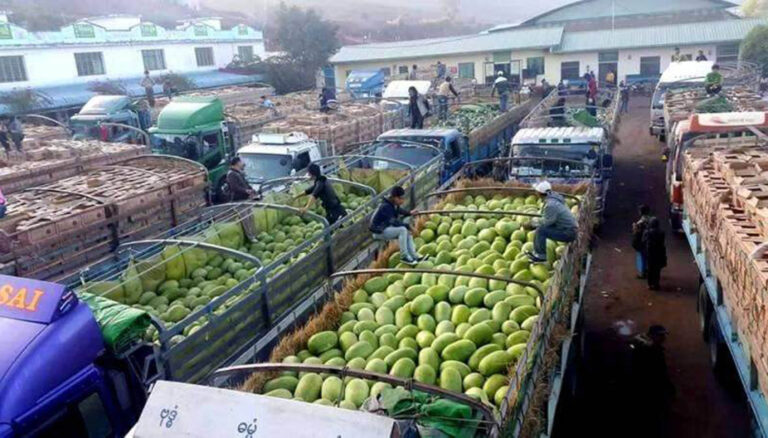December 23
My anmar’s watermelon is offered at a low price in export to China owing to inferior quality, said Sai Khin Maung from Khwar Nyo Fruit Trading Depot.
“It sounds reasonable. We sell the fruits at Wang Ding depot. Quality deterioration of fruits occurs due to insufficient operational activities such as handling, transportation and storage along the supply chains,” Sai Khin Maung elaborated.
Additionally, traders must evaluate market demand and cost estimation, he added.
“Wang Ding depot is the initial stage in watermelon exports. Excess supply without doing any calculation on market demand and cost makes the market calm down. Furthermore, pesticide and fertilizer use affect fruit quality. Traders are supposed to closely observe the market to ensure profitability. They were so shocked after deducting transport costs, taxes and cultivation costs. Traders had better not take a risk unless they are sure about 30 per cent profit. Regardless of profitability, the charges, taxes and levies are inevitable”, Sai Khin Maung said.
The prevailing prices stand at 1.2 Yuan for 855N watermelon, 2.5 Yuan for Taiwan watermelon and 1.5-2 Yuan for seedless watermelon depending on quality.
Approximately 70 truckloads of watermelon and muskmelons are to be conveyed to China per day.
Myanmar’s watermelon and muskmelon are heavily reliant on the Chinese market. The traders grappled with China’s strict virus policy.
Last year, the COVID-19 restrictions hindered Myanmar’s watermelon and muskmelon exports to China. Chinese Customs Regulation increased delay. Long delays of trucks caused harm to watermelon quality and only one in five trucks heading to China remained undamaged with quality watermelons.
The traders are observing delivery time, price and profitability as they are perishable fruit, while they are trying to explore new markets besides China.
On 1 April, Nantaw and Sinphyu border posts were suspended in the wake of COVID-19 impacts. China has closed down the major border crossing Mang Wein from 30 March 2021 following the COVID-19 cases in Myanmar.
On 8 July 2021, the two-remaining cross-border posts Kyinsankyawt and Panseng were suspended. As a result of this, the border trade between Myanmar and China was completely halted.
Among Sino-Myanmar land borders, the Kyinsankyawt post resumed operations on 26 November on a trial run.
At present, Myanmar daily delivers rice, broken rice, rubber, various beans and pulses, fishery products, chilli pepper and other food commodities to China through Kyinsankyawt by 100 trucks and building materials, electrical appliances, household goods and industrial raw materials are imported into the country by 40 trucks. — NN/EMM


